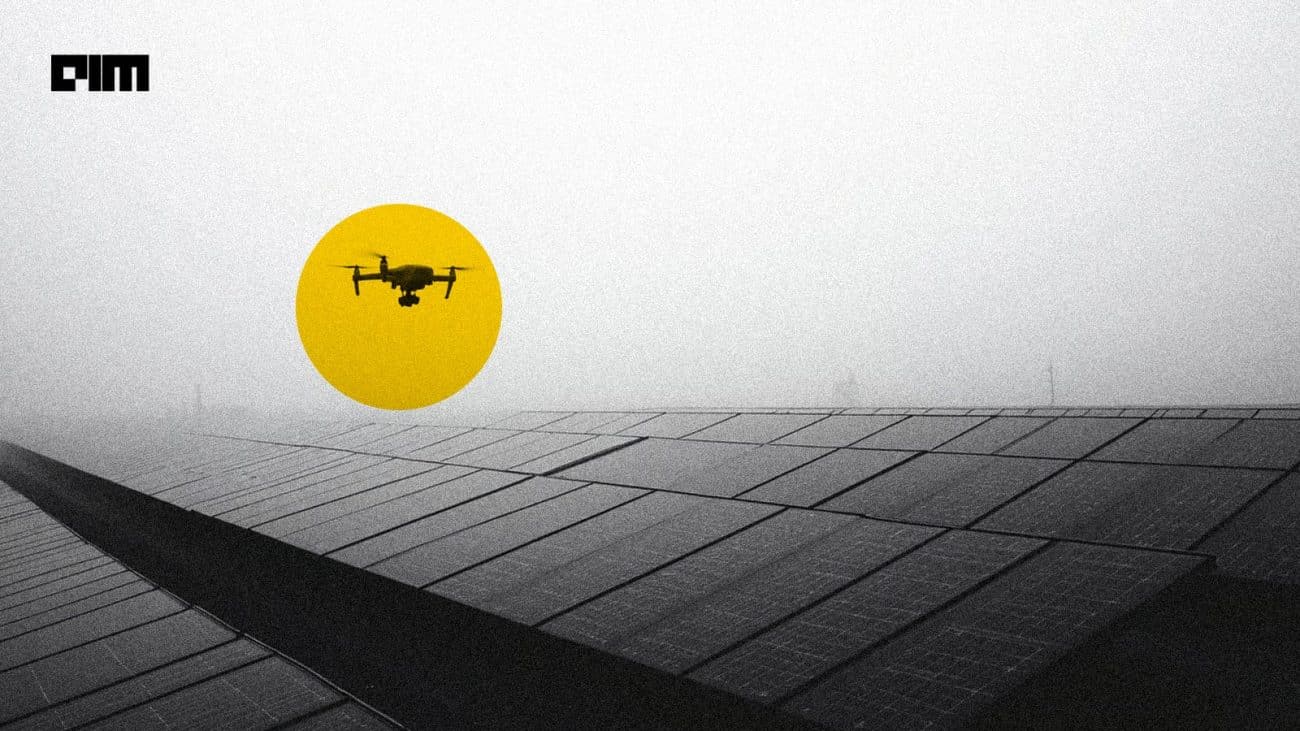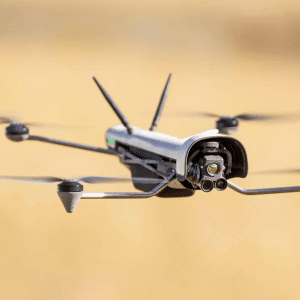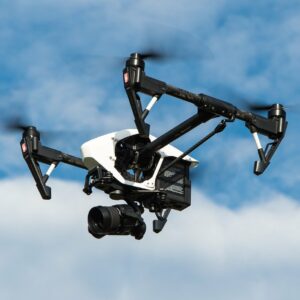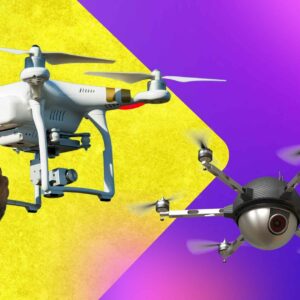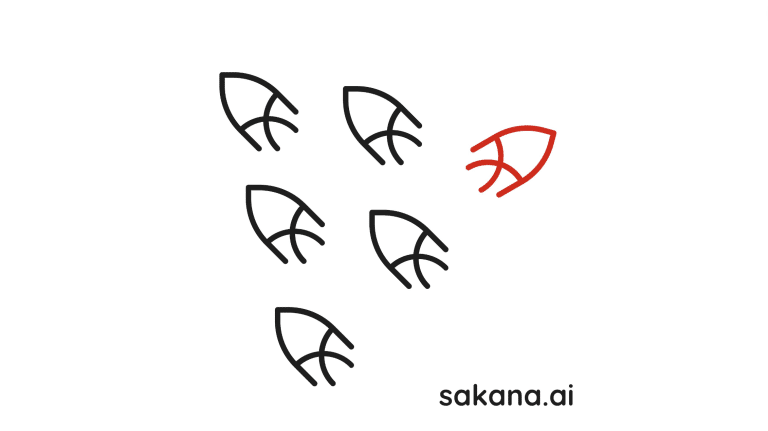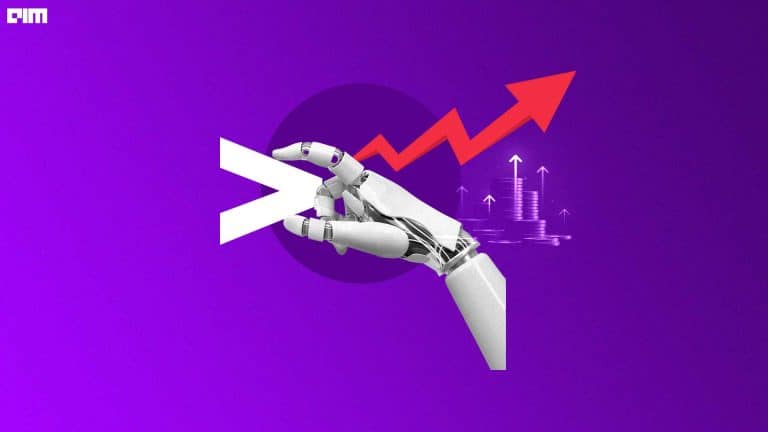India’s solar energy sector is undergoing a massive transformation, led directly by ‘PM Surya Ghar: Muft Bijli Yojana’, the world’s largest rooftop solar initiative. The goal is to bring solar power to one crore households by March 2027.
As installations rapidly increase, with over 10 lakh installations expected by next month, the numbers are expected to double by October this year, reach 40 lakhs by March 2026, and ultimately achieve the target of one crore by March 2027.
Bengaluru-based Skylark Drones is at the forefront of transforming the renewable energy sector and making a significant impact by offering AI-powered drone technology to automate solar panel inspections, detect defects, and optimise performance.
This approach enhances the quality and volume of data collected, reduces costs and ensures worker safety.
In an exclusive interview with AIM, Mughilan Thiru Ramasamy, co-founder and CEO of Skylark Drones, revealed the startup’s plans to scale its drone imaging processes for solar panels in various cities of India. He further shared insights into the company’s diverse projects and their impact on the industry.
The company is actively involved in projects ranging from rooftop solar potential mapping to solar panel defect detection, showcasing its commitment to enhancing the efficiency and safety of solar energy infrastructure.
India’s First Software for Spray Management
On Tuesday, the startup unveiled Drone Mission Ops (DMO) for agriculture, India’s first software platform that is set to transform how agricultural drones are managed and operated across the country, at the Krishi Darshan Expo 2025 in Hisar.
The platform, compliant with the Directorate General of Civil Aviation (DGCA), offers features such as real-time fleet management, crop-specific recommendations, and automated health monitoring. It is also accessible in local languages.
While the company has already executed over 10 million autonomous drone flights and processed over 100 million drone images across more than 120 enterprise customers nationwide, it still faces challenges, including regulatory hurdles and the need for greater awareness and adoption of drone technology.
The company is backed by investors, including Thakral Corporation, Info Edge Ventures, AdvantEdge Partners, Turbostart, IIM Udaipur Incubation Centre, and Hunch Ventures.
Mapping Rooftop Solar Potential
Skylark Drones collaborated with the renewable energy ministry to map rooftop solar potential across 120 Indian cities.
The scale of the project is vast, with the company mapping around 10 crore to 20 crore roofs across these cities in just about six months.
By using drones with high-resolution imaging (five centimetres per pixel data), Skylark can determine the optimal number of solar panels for a given roof and estimate the power generation potential.
The PM Surya Ghar scheme, launched by PM Narendra Modi on February 13 last year, offers households a subsidy of up to 40%, making renewable energy more affordable and accessible.
Within nine months of the launch, 6.3 lakh installations were completed, resulting in a monthly installation rate of 70,000 – ten times higher than the pre-scheme average.
The program aims to benefit one crore households and is expected to save the government ₹75,000 crores annually in electricity costs.
The startup faces competition from players like Asteria Aerospace, ideaForge and Envoler Innovations, which offer drone-based solutions for anomaly detection, plant surveillance, and thermography.
Other notable companies contributing to drone applications in solar energy include FlyNex and global players DJI Enterprise.
Skylark claims to have worked on over 2.25 GW of energy for players like Bosch, CleanMax Solar, SB Energy, Sterling and Wilson, Sprng Energy, etc.
Real-Time Inspection and Dust Detection
Skylark Drones also focuses “on automatically detecting defects in solar panels” to optimise energy production.
When it comes to ground-mounted solar installations, where “there are nearly one lakh solar panels”, identifying defective panels is crucial. The startup provides a mapping service that pinpoints the exact location of defective panels, enabling targeted maintenance and improved energy output.
The company’s work with CleanMax Solar involves perimeter surveillance and real-time inspection of a 350 MW plant spanning approximately 1,500 acres.
Using drone technology integrated with dock stations, Skylark monitors the perimeter and identifies defects. “We have a real-time defect identification software where the drone automatically goes to the panel and identifies this defect,” Ramasamy stated.
Drones equipped with dock stations monitor the perimeter at night, identifying defects in real time. The system notifies personnel of the specific panel requiring inspection and repair, allowing for immediate action.
Moreover, the company is developing a ‘dust detection module’ to identify dust accumulation on solar panels, which could potentially be used in applications for targeted drone cleaning solutions. “You can have a spraying drone, which will go spray only those places which are dirty,” Ramasamy said.
This technology can optimise cleaning schedules and reduce water consumption through targeted spraying for facilities with hundreds of thousands of panels. The company envisions a future use case where drones will be equipped to clean solar panels, further reducing water usage, manual labour, and maintenance costs.
“Cost per unit of solar will reduce because maintenance cost and water wastage now reduces and we can save at least 10 paise to 20 paise like this,” Ramasamy pointed out.
Skylark Drones’ approach to solar power, integrating mapping, defect detection, and real-time inspection, underscores its commitment to revolutionising the industry through drone-based solutions.
Moreover, the company is involved in flood risk assessment for solar farms, helping companies to strategically install solar parks in safer locations.
Not Limited to Solar
Skylark is creating a software platform to scale solutions for various companies, each with different use cases.
Ramasamy explained that while scaling these solutions can be difficult and requires a lot of account-based management, there is so much scope for learning from every customer interaction.
Instead of simply applying a one-size-fits-all solution, the company focuses on understanding each client’s unique problems and tailoring a solution from their “basket” offerings. For example, they recently closed a deal with GPS Renewables, a biogas manufacturer.
The startup has also worked with companies such as Tata to monitor stockpiles and use drones to estimate the volume of excavated minerals in stockyards.
This data is displayed on a dashboard, enabling clients to monitor stock levels, perform FIFO (first in, first out) analysis, and determine shipping priorities.
“They excavate all their mine minerals and put them in a stockyard. We fly our drone on a daily basis to estimate how much volume is there in the stockyard.”
In the case of biogas, the company requires a volume dashboard. “The stockyard shrinks daily by some centimetres, and we monitor how much is shrinking and provide appropriate services.”
Moreover, with other partners like UltraTech Cement, the startup carries out seamless Mineral Conservation and Development Rules-compliant drone surveys and inspections.
By transforming drone data into actionable insights, the drone industry is set to revolutionise sectors beyond solar power, including mining, infrastructure, and more.


